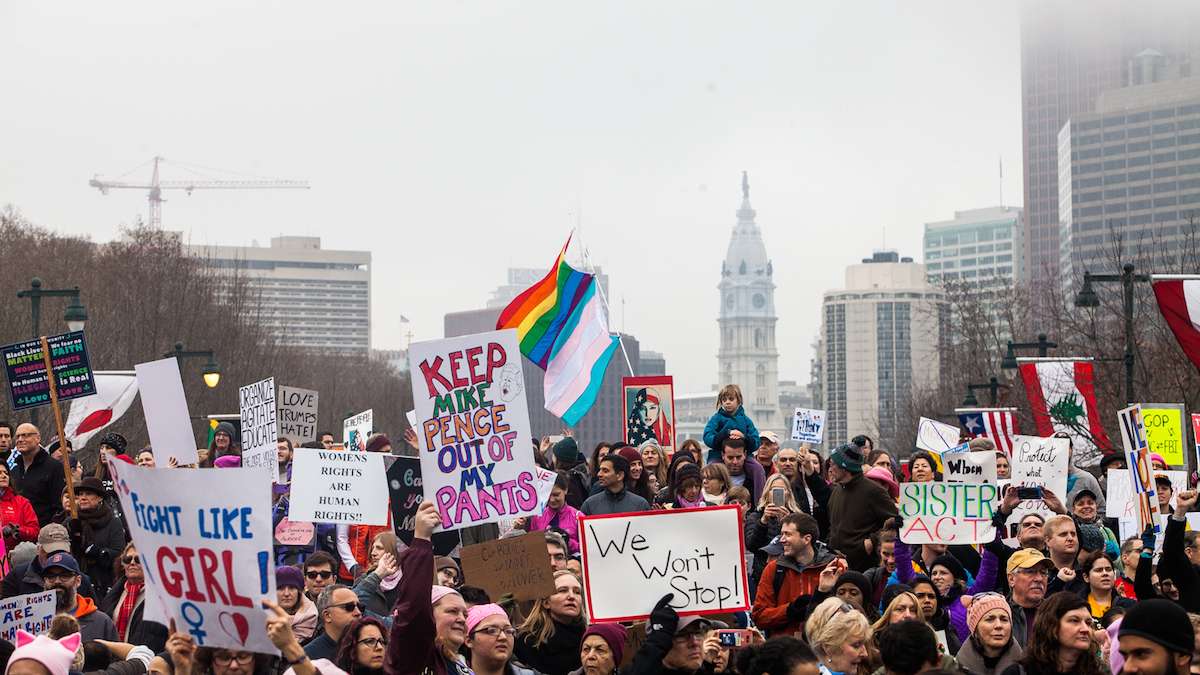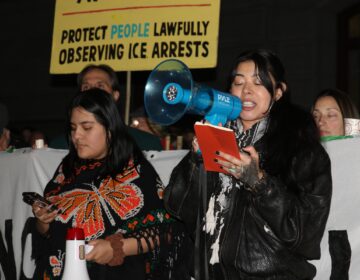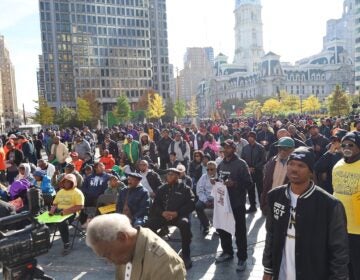A year later, Women’s March organizers see need for ongoing protest
Millions rallied worldwide for women's rights during last year's Women's March. Organizers in Philly expect even bigger crowds this year.

Protesters are shown gathered on the Benjamin Franklin Parkway for the Women's March in Philadelphia on Saturday, Jan 21, 2017. (Brad Larrison for WHYY)
Almost a year ago, millions of people rallied around the country during The Women’s March in what some say was the largest single-day protest in recorded U.S. history.
Much of marchers’ frustration focused on fears of how President Donald Trump and his conservative colleagues might erode women’s rights.
The event wasn’t envisioned as an annual thing. But female frustration has faded not one whit during a year that saw lawmakers tighten abortion restrictions, let funding lapse for children’s health care insurance, support politicians such as Roy Moore despite sexual misconduct accusations, and otherwise trample women’s rights.
So there will be a second Women’s March on Jan. 20 in dozens of U.S. cities from Seattle to St. Petersburg, Florida.
In Philadelphia, where more than 55,000 people packed Center City during last year’s march, organizers expect even bigger crowds this year to fill the Benjamin Franklin Parkway.
After all, in this #MeToo era, said organizer Emily Cooper Morse, there’s just so much to protest.
“Women are finally done with a predominantly male-centric culture,” said Morse, 34, of Phoenixville. “We’re ready to move on from that. We’re ready to call our own shots. I think it’s still in its infancy. But this is where it starts.”
Beth E. Finn, another march organizer, agreed: “We did not expect last year to do this again. But the conditions are such that we need to still make sure our voices are still heard.”
The goal? To get more women in political office — or candidates of any gender who will better represent women.
“We’re no longer going to be silent,” Morse said. “We’re no longer going to be the typical political wife on your arm. We’re going to be the politician, and you’re welcome to stand by and support us.”
Finn and Morse pointed to Roy Moore’s defeat in Alabama, Rebecca Rhynhart’s election as Philly’s first female controller, and Ashley Bennett’s win in Atlantic County as “glimmers of hope.”
“Things don’t change overnight, and we can’t get complacent about all of the frustrating things coming from our lawmakers,” Finn said.
Morse was the march’s lead organizer last year — an impressive feat, considering the biggest thing she’d planned to that point was her wedding (125 guests) and her kids’ birthday parties.
“I didn’t know how to file for a permit. I didn’t know how to do any of it,” she laughed.
As a mother of three who juggles motherhood with a full-time job and nighttime college classes, Morse found her work planning the march so fulfilling that she agreed to do it again this year — with a bigger team behind her.
Finn, 41, of Center City, has been with her from the start. Her current fight for women’s rights started before the election, when Trump talked about registering Muslims.
“It was just so reminiscent of what was happening in Europe before the Holocaust. As a Jew, I knew that ‘never again‘ has to mean something. So I knew I had to do something,” said Finn, who volunteered for Hillary Clinton’s campaign and then helped Morse organize Philly’s march last year.
Then, the march and speeches lasted five hours. This year, organizers are tightening the schedule and aim to come in under three hours. They are focusing on “ordinary women doing amazing things to fight for women’s rights.”
The 2018 theme: “We resist, we persist, and we rise.”
“We’re reflecting back on what got us into this in the first place, which was predominantly speaking out against not allowing the behavior of the Trump administration to become the new normal,” Morse said. “We still no longer accept what this current administration is about, and is trying to do.”
The Philadelphia march is one of several “sister marches” planned. Other marches are scheduled nearby in Trenton and Morristown in New Jersey; Newark, Delaware; and New York City.
WHYY is your source for fact-based, in-depth journalism and information. As a nonprofit organization, we rely on financial support from readers like you. Please give today.




